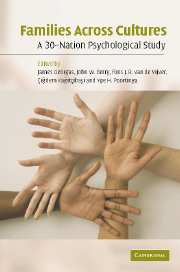Book contents
- Frontmatter
- Contents
- List of figures
- List of tables
- List of contributors
- Acknowledgments
- Prologue
- Part I
- Part II
- 9 The Algerian family: change and solidarity
- 10 Botswana
- 11 The Brazilian jeitinho: Brazil's sub-cultures, its diversity of social contexts, and its family structures
- 12 Britain
- 13 Bulgaria: socialism and open-market economy
- 14 Canada
- 15 Chile: new bottle, old wine
- 16 Cyprus
- 17 Portrait of family in France
- 18 Georgia
- 19 Germany: continuity and change
- 20 Ghana
- 21 Greece
- 22 Hong Kong, SAR China: transitions and return to the motherland
- 23 India
- 24 Indonesia: traditional family in a changing society
- 25 The Iranian family in a context of cultural diversity
- 26 Japan: tradition and change in the Japanese family
- 27 Mexico
- 28 Mongolia: traditions and family portrait
- 29 The Netherlands: tolerance and traditionalism
- 30 Nigeria
- 31 Pakistan: culture, community, and filial obligations in a Muslim society
- 32 The Saudi society: tradition and change
- 33 The South African family
- 34 South Korea
- 35 Spain: tradition and modernity in family structure and values
- 36 Turkey
- 37 Ukraine
- 38 Family in the United States: social context, structure, and roles
- Appendix
- References
- Index
31 - Pakistan: culture, community, and filial obligations in a Muslim society
Published online by Cambridge University Press: 10 December 2009
- Frontmatter
- Contents
- List of figures
- List of tables
- List of contributors
- Acknowledgments
- Prologue
- Part I
- Part II
- 9 The Algerian family: change and solidarity
- 10 Botswana
- 11 The Brazilian jeitinho: Brazil's sub-cultures, its diversity of social contexts, and its family structures
- 12 Britain
- 13 Bulgaria: socialism and open-market economy
- 14 Canada
- 15 Chile: new bottle, old wine
- 16 Cyprus
- 17 Portrait of family in France
- 18 Georgia
- 19 Germany: continuity and change
- 20 Ghana
- 21 Greece
- 22 Hong Kong, SAR China: transitions and return to the motherland
- 23 India
- 24 Indonesia: traditional family in a changing society
- 25 The Iranian family in a context of cultural diversity
- 26 Japan: tradition and change in the Japanese family
- 27 Mexico
- 28 Mongolia: traditions and family portrait
- 29 The Netherlands: tolerance and traditionalism
- 30 Nigeria
- 31 Pakistan: culture, community, and filial obligations in a Muslim society
- 32 The Saudi society: tradition and change
- 33 The South African family
- 34 South Korea
- 35 Spain: tradition and modernity in family structure and values
- 36 Turkey
- 37 Ukraine
- 38 Family in the United States: social context, structure, and roles
- Appendix
- References
- Index
Summary
A HISTORICAL OUTLINE OF PAKISTAN
Although Pakistan is a recent political creation, the roots of its culture and society can be traced back to the Indus Valley civilization (c. 2500–1600 BC). For the last 1,000 years, the regions that constitute Pakistan today have been predominantly Muslim. The rule of the Muslim Mughal Empire in India formally came to an end in 1857, when the British (who had originally entered India as traders in the early seventeenth century) placed India directly under the crown and made Queen Victoria the Empress of India. For the following hundred years India was a British colony, and in 1947 when the British left India, Pakistan became an independent nation and a national homeland for Muslims. After Partition, East Pakistan, which had many linguistic and cultural differences from West Pakistan, seceded to become Bangladesh in 1971. Pakistan's present-day population is approximately 140 million, making it the seventh most populous country in the world. Islamabad is its capital, with a population of 805,000.
ECOLOGICAL FEATURES
Pakistan is bordered by India in the east, China in the north, and Iran and Afghanistan in the west. The landscape of the country is diverse; it has a coastline on the Arabian sea, long stretches of desert, fertile plains, and some of the highest mountain peaks in the world. Pakistan is divided into four provinces: Sindh, Punjab, Baluchistan, and The North-West Frontier Province (NWFP).
- Type
- Chapter
- Information
- Families Across CulturesA 30-Nation Psychological Study, pp. 427 - 434Publisher: Cambridge University PressPrint publication year: 2006
- 13
- Cited by

